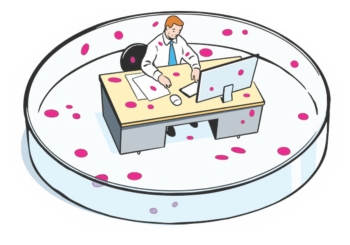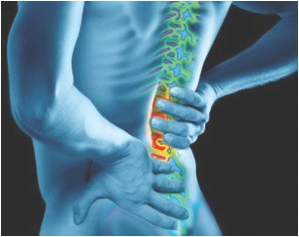| Home - Back Issues - The Team - Contact Us |
 |
| Volume 11 |Issue 39| October 05, 2012 | |
|
|
Health Biggest Office Aches Medical professionals have been telling us for years: sitting at a desk is killing us, literally. If you want to avoid an untimely demise under the florescent lights of that cubicle you love, read the biggest health problems that can come from working in an office, and the ways to prevent them. Lower-Back Pain
Make sure you stand often; the simple act of standing improves blood flow and engages your muscles from feet to trunk. If you do not have a reason to get up, make one! Moving your desk items such as printer, scotch tape, fax machine away from your desk, as well as getting up to talk to someone instead of sending them an email can help you get up and around more often. The chair that you sit in is also very important; it should help support good posture and not reinforce bad ones. Eyestrain Programmers sorting through thousands of lines of code on a mountain dew fuelled 3am coding binge are well aware of the melty eye phenomenon. Well, the feeling that your eyes may be, literally, melting out of your head isn't too far off from reality; staring at a computer screen for long periods of time can lead to blurry and overly sensitive eyes, too-watery or too-dry eyes, headaches or a sore neck according to the Mayo Clinic in Minnesota, USA. Prevention: To prevent eyestrain at your computer, increase your font size so you don't have to squint. You should also rest your eyes frequently by looking away from your computer screen, which, coincidentally, is a perfect excuse when your boss catches you taking a little catnap, “I was just resting my eyes to reduce eyestrain, boss.” If he doesn't believe you, make sure he knows that as a worse case it can cause dizziness, fatigue or vomiting and is often attributed to learning and attention problems. Viruses/Bacteria
Also, if you bring your own lunch, remember that raw and cooked foods need to remain refrigerated; leaving them out for two hours or more is a food safety no-no. Obesity Obesity is a main factor in increased levels of LDL cholesterol in blood, blood clotting and other dangerous medical conditions. It can also have affects on your muscles and posture, resulted in a downward spiral of a healthy mind and body. Obesity is also a main contributor to Erectile Dysfunction in adult males; which should be enough reason for all our guy readers to hit the gym, now. Prevention: Watch what you eat at the office and do not pig out with a big meal at lunch. Besides being unhealthy for you, a large lunch will most certainly not help as you try to keep your eyes open during the afternoon doldrums. Health experts say that the best way to keep your waistline from expanding is small meals more often. Also, instead of munching on chips and chocolate bars throughout the day, keep it healthy. Colon cancer Prevention: As with many of the other items on this list, getting up and moving around during the day, as well as a healthy diet can help to reduce this risk. Broccoli has been identified as a leading preventative agent in the fight against colon cancer, so it could be a good idea to load up on a lunch full of that green leafy vegetable. However, broccoli also causes flatulence; if colon cancer doesn't get you, your stinky farts may just turn the tables and give your coworkers the incentive they need to get there first. Heart disease As well as the other contributing factors already listed, it is due in part to working long hours and having less time for exercise, healthy eating and physician's visits. Working in an office can also expose workers to more stress, less sleep and engage in other behaviors which contribute to cardiovascular risk, particularly that much needed smoking break. Prevention: Getting up from your desk every 30 minutes can decrease the risk of having a heart attack. Take time during your lunch break to go for a stroll at a brisk pace and drink more water. However, if you're getting up for a cigarette, you're not fooling anyone. Get back to work. Source: Pacific Prime Blog, an international health insurance blog.
|
Copyright
(R) thedailystar.net 2012 |
 Prevention: Besides being better aware of your posture as you're sitting at your desk, getting regular exercise, including abdominal strengthening activities, should relieve some of the pressure on your lower back.
Prevention: Besides being better aware of your posture as you're sitting at your desk, getting regular exercise, including abdominal strengthening activities, should relieve some of the pressure on your lower back. Prevention: If you frequently eat your lunch at your desk, you may want to make sure you have hand sanitizer and antibacterial wipes to wipe down your work surface daily. That can also protect you from germs sprayed into the air by your coughing and sneezing coworkers. If your office has a communal kitchen sink with a sponge, use paper towels instead, just to stay safe from bacteria. And tell that dirty non-hand washing salesman to wise up, or else.
Prevention: If you frequently eat your lunch at your desk, you may want to make sure you have hand sanitizer and antibacterial wipes to wipe down your work surface daily. That can also protect you from germs sprayed into the air by your coughing and sneezing coworkers. If your office has a communal kitchen sink with a sponge, use paper towels instead, just to stay safe from bacteria. And tell that dirty non-hand washing salesman to wise up, or else.